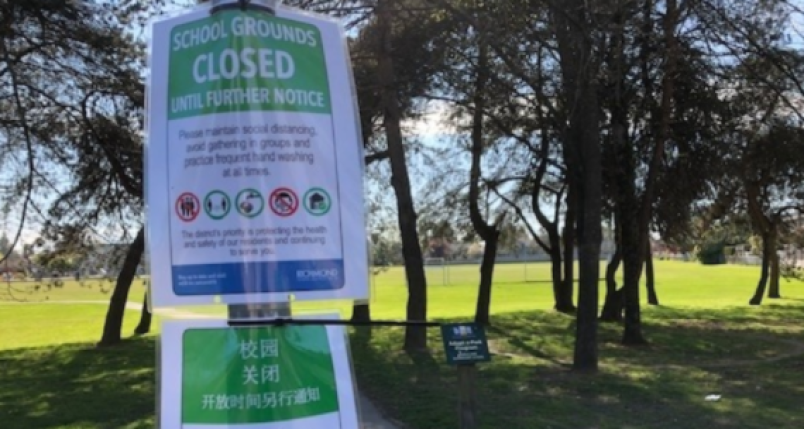Despite signage that may indicate otherwise, people are encouraged to walk safely around their neighbourhood school grounds and city green spaces, including sports fields, for fresh air and a mental respite.
However, sports fields are not to be used by groups of people for games and playgrounds remain off bounds in communities as part of the COVID-19 pandemic response to ensure physical distancing from one another.
The Â鶹´«Ã½Ó³»School Board has placed signs on its sports fields stating they are “closed.” And, the Richmond Board of Education has placed signs at park entrances stating “School Grounds Closed.”
The signs read as a blanket prohibition on entering those spaces, including if only for walking alone or with your household members — something encouraged by Provincial Health Officer Dr. Bonnie Henry to promote mental health.
What is not made clear is how individual household members, who maintain distance from others, may use these sports fields passively.
Using one’s neighbourhood parks and green spaces, including sports fields, for individual or household use at a proper distance is also encouraged by officials to avoid clusters of many individuals and households in central and popular locations such as Stanley Park in Â鶹´«Ã½Ó³»or Garry Point Park in Richmond, where pedestrian movements are now being regulated.
Vancouver’s signage drew questions on Twitter from city councillor Christine Boyle.
“These are well-used green spaces across the city, and from what I’ve seen, people have been respecting [physical distancing] rules well while using the,” she told the board on April 23.
The board replied: “People can still enjoy [Vancouver] school grounds, but are urged to practice [physical distancing].” The board sent a similar message to Glacier Media, although there was no specific clarification on what the closure entails specifically. Boyle asked if it was OK to throw a Frisbee and the board reiterated that the sports fields (and basketball and tennis courts) are closed but “you can still enjoy [Vancouver] school grounds spaces/green spaces,” which presumably include sports fields.
There is no public health order requiring sports fields and playgrounds to close. Henry does, however, discourage gatherings of people and the board — and possibly all others in the province — took it upon itself to close sports fields and playgrounds to group play after encountering some people not following Henry’s group gatherings advice and guidelines.
Still, the language in Vancouver’s April 16 public memo remains ambiguous to passive use: “Prohibiting use of sports fields and surfaces, along with playground equipment, is intended to discourage gatherings of people as directed by the Public Health Officer and Â鶹´«Ã½Ó³»Coastal Health.”
In Richmond, similar impreciseness exists. There, the Richmond School District has erected signs that could encourage people to seek green space elsewhere. “School grounds closed,” say the signs in large font, with no indication that even the trails and walking paths are free to use.
“In order to ensure the safety of our community and limit exposure, the district will be controlling access to all school grounds, buildings and all exterior entrances will be locked,” explained district spokesperson David Sadler.
“At this time, our priority is on doing everything we can to ensure the safety of our students, their families and our staff members. The district will continue to be responsive to information provided by the Provincial Health Officer and Â鶹´«Ã½Ó³»Coastal Health. When they indicate that overall restrictions are being eased, the district will consider how to align our practices with that,” stated Sadler.
If Richmond’s school grounds were closed entirely, it may result in people staying inside unnecessarily. Or, people may resort to using narrow sidewalks only or seeking green space elsewhere, such as the city’s popular dyke trails and, for example, Garry Point Park, which is now subject to large gatherings of individual households (so much so that the city instituted one-way walking paths).
Richmond’s district also placed its signs on city property in many locations, given school grounds and city-owned green space is often adjoined.
Couns. Alexa Loo and Kelly Greene are city council liaisons to the school district.
“The parks are open and people are encouraged to use them and maintain social distancing with people not from their household,” Loo clarified.
She said the two entities work together but signage is a matter for the school board.
Greene said the signs “are not crystal clear” and “perhaps there’s an opportunity to fine tune” them.
Greene said city staff told her sports fields are closed in Richmond, like Vancouver, however Greene clarified “sport fields may be used for casual recreation provided appropriate social distancing is in place.”
But for now the city’s own website makes no mention of such casual recreation.
Greene also noted “the [City of Richmond] is encouraging residents to discover their neighbourhood parks and stay close to home.”



